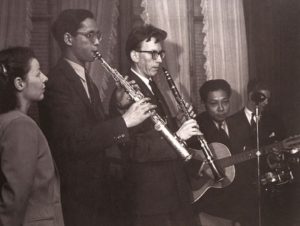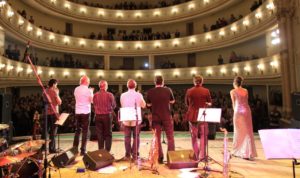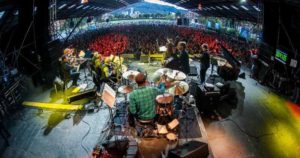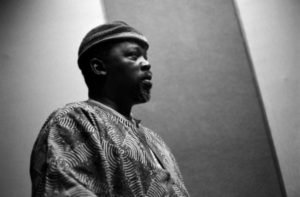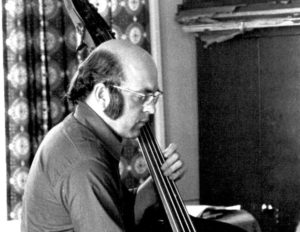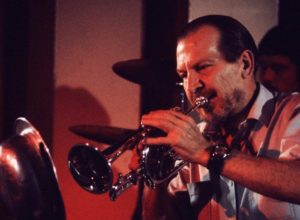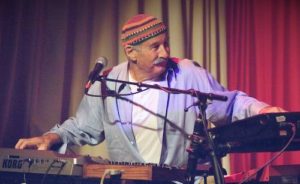Jazz in Botswana
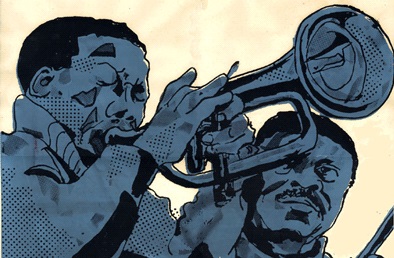
Botswana’s independence came in 1966, and the country was led until his death in 1980 by the steady hand of Seretse Khama. Despite often volatile neighbours, the country has avoided being drawn into local conflicts, and has maintained remarkably consistent economic and democratic development. Botswana’s political stability and its proximity to South Africa made it an attractive place for ex-patriate South African musicians.
In the early 1980s, a group of artists who had fled Apartheid, set up a cultural resistence collective, the Medu Arts Ensemble, in Gaborone. Although much of the focus was on the visual arts, there was a strong jazz contingent with Hugh Masekela, Steve Dyer and trombonist Jonas Gwangwa among those involved. Gwangwa led a band Shakawe, which included compatriots saxophonist Dyer, trumpeter Dennis Mpale, but also Batswana musicians like Serowe-born guitarist, Bonjo Keipidile (born 1954) and drummer Tsholofelo Giddie. Keidipile brought into the band the influences of traditional musicians like Ratsie Setlhako. Masekela’s band Kalahari included Mosotho singer Tshepo Tshola and local guitarists John Selolwane and Banjo Mosele (born 1960). The two bands would perform regularly in Gaborone’s two leading venues, the Bluenote and Woodpecker Inn. Kalahari recorded a couple of albums in Gaborone, including Techno-Bush, made at the Woodpecker in 1984.
The success of the Medu Arts Ensemble ended in tragedy in June 1985 when the South African Defence Force raided Gaborone killing several members of the Medu, including close friends of Masekela. Gwangwa himself narrowly escaped death. Medu and the Shakawe band folded, while Masekela reformed Kalahari in London. With the Apartheid regime’s extra-judiciary assassinations of ANC and Medu personnel, the short-lived golden age of jazz in Botswana had its heart ripped out after just a few years. Keipidile, though recognised as a pioneering guitarist in Botswana, has struggled to find suitably appreciative venues and audiences, and has yet to record his debut album. Mosele moved to Norway and has recorded as a singer-songwriter. He performed as a headliner in Tokyo in 2010 with veteran Japanese saxophonist Sadao Watanabe. Selolowane was part of Paul Simon’s touring group from 1987 to 1994, and again on the 2012 Graceland reunion tour.
Steve Dyer left Botswana for Zimbabwe in 1986, leaving behind a young son, Bokani Dyer who, still in his 30s has already attained a lot of international recognition. He won the 2011 Standard Bank Young Artist Award for Jazz, and has appeared at Ronnie Scott’s in London and the B-Flat in Berlin. Though born in Gaborone, Bokani Dyer grew up in South Africa from the age of four. Trumpeter/karate teacher Socca Moruakgomo, who was mentored by Masekela and has shared a stage with Miriam Makeba, has performed at festivals in the Caribbean and Switzerland, and toured Germany and Switzerland.
Gaborone-born, jazz-influenced singer-songwriter Shanti Lo is another artist who has attracted attention outside of Botswana. Lo’s blend of Tswana folk music, jazz and soft rock was featured in the Botswana-based TV series No.1 Ladies Detective Agency (in which the main character Mme Ramotswe’s abusive ex-husband is a jazz trumpeter). Lo’s 2014 album Lerato was produced by Kalahari guitarist, John Selolwane. Since 2014, Gaborone has hosted the annual Hamptons Jazz Festival, which has hosted international stars like Billy Ocean and Salif Keita, while also featuring local talent like Moruakgomo, Shanti Lo, award-winning singer Punah Gabasiane and saxophonist Lister Boleseng.
